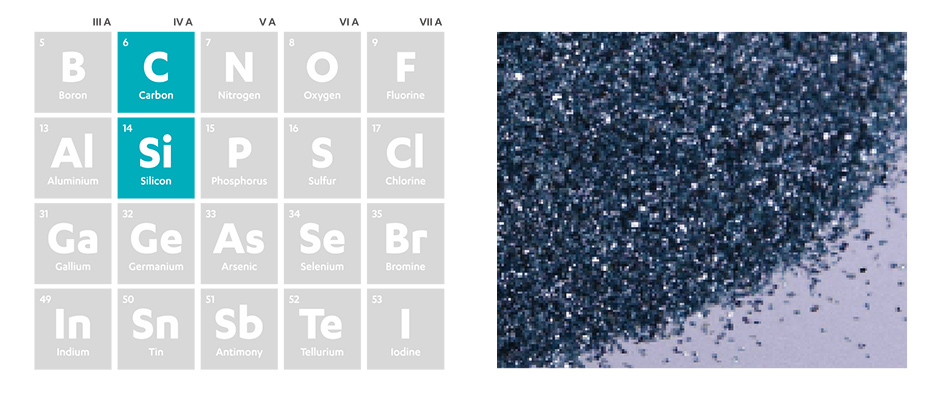SiC
Si(silicon)+C(carbon)=SiC
Silicon carbide is a group IV - IV compound semiconductor material formed by C and Si elements in the ratio of 1:1,
and its hardness is second only to diamond.
This semiconductor material has great development potential, but is hard and brittle.
The preparation process is complex and the processing is difficult.
SiC Features
Excellent physical properties
Wide bandgap (High temperature resistance)
1
High critical breakdown field(High voltage resistance
2
High thermal conductivity(Heat dissipation)
3
Saturated electron drift velocity(High switching speed)
4
|
|
4H-SiC
|
Si
|
GaAs
|
GaN
|
|
Wide bandgap(eV)1
|
3.26
|
1.12
|
1.42
|
3.42
|
|
High critical breakdown field(MV/cm)2
|
2.8
|
0.3
|
0.4
|
3
|
|
High thermal conductivity(W/cmK)3
|
4.9
|
1.5
|
0.46
|
1.3
|
|
Saturated electron drift velocity(1E7 cm/s)4
|
2.7
|
1
|
2
|
2.7
|
1.A wider bandgap can ensure that electrons are not easy to transit and intrinsic excitation is weak at high temperature. Thus, it can withstand higher operating temperature.
The bandgap width of silicon carbide is three times that of silicon, and its theoretical working temperature can reach more than 400 ℃.
2.Critical breakdown field strength refers to the electric field strength in electric breakdown. Once this value is exceeded, the material will lose its insulation performance.
It determines the voltage resistance of a material.
The critical field strength of silicon carbide is about 10 times that of Si, which can withstand higher voltage and is more suitable for high voltage devices.
3.Heat is one of the main reasons affecting the lifetime of devices.
The thermal conductivity represents the material's ability to conduct heat.
The high thermal conductivity of silicon carbide can effectively conduct heat, reduce the device temperature and maintain its normal operation.
4.The saturated electron drift velocity refers to the maximum directional moving speed of electrons in semiconductor materials.
It determines the switching frequency of devices.
The saturated electron drift velocity of silicon carbide is twice that of silicon, which can miniaturize the device and improve efficiency.
SiC Applications
Power Electronics Devices
SiC power devices have unique advantages such as high voltage, high current, high temperature, high frequency and low loss, which will greatly improve the energy conversion efficiency of existing silicon based power devices and have a significant and far-reaching impact on the field of efficient energy conversion.
The main application fields are electric vehicles, charging piles, photovoltaic new energy, rail transit, smart grid, etc.
Microwave Communication
Silicon carbide based gallium nitride RF devices have been successfully applied in many fields, mainly in wireless communication infrastructure.
Silicon carbide as substrate gallium nitride RF devices have both good thermal conductivity of silicon carbide and advantages of high-power RF output of gallium nitride in high frequency band, which can provide the power and efficiency required by the next generation of high frequency telecommunication network and become the mainstream choice of 5G base station power amplifier.





